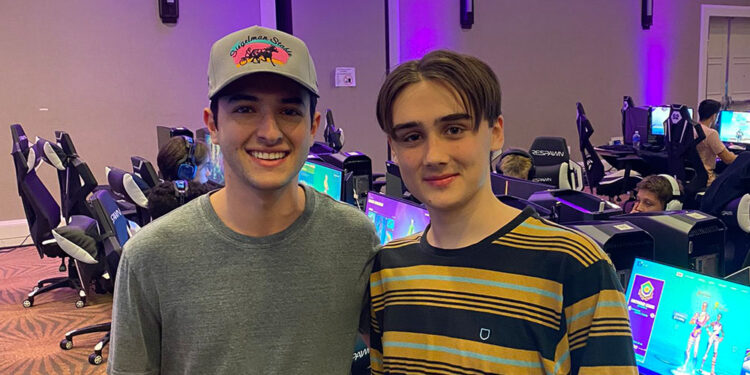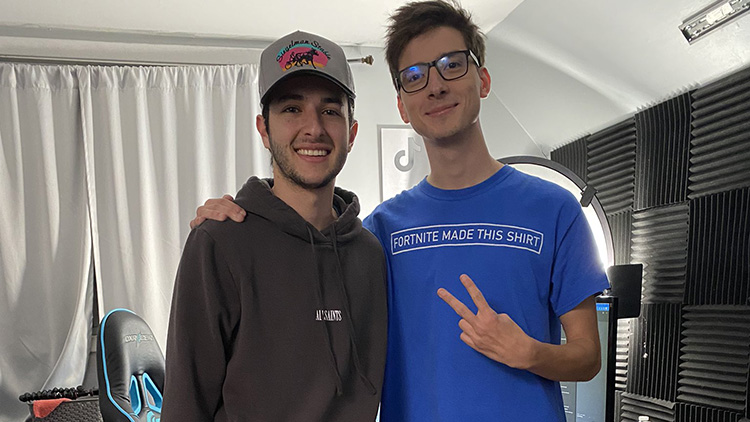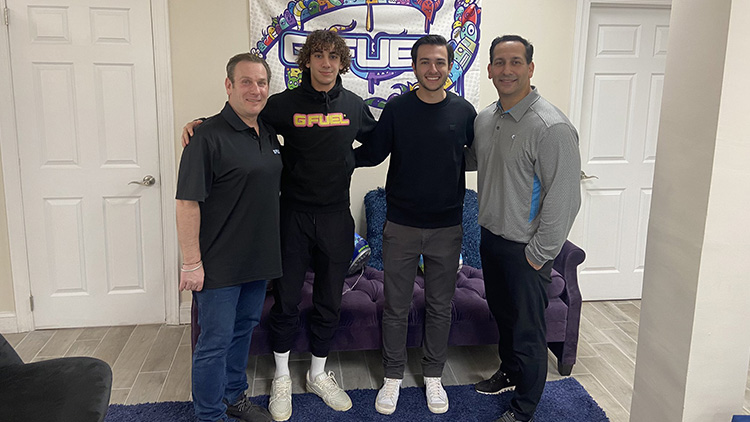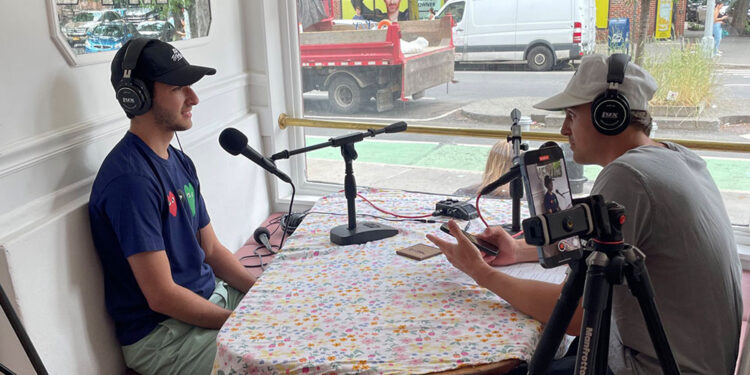Welcome to a new TEA long-form content series called “The Path,” where we profile the unique journeys of professionals of all ages and backgrounds as they try to find their way in the esports and gaming industry.
Our very first profile tells the story of Reed Rosen, a college student who began his journey playing Fortnite competitively in high school, and ended up managing a roster of professional Fortnite players and content creators. How did he get there and where is he headed? Here’s his story.
Strong Island
Reed Rosen has lived on Long Island since he was five-years-old. He grew up in a typical small town and had what can best be described as the average American middle-class childhood, with caring parents, a stable home environment, friends to play video games or sports with, and enough common sense to avoid getting into any kind of serious trouble.
Throughout his childhood, he treated gaming like a lot of other kids do; he played games like Madden Mobile, Clash of Clans, Club Penguin, and Toontown with his friends, at home on his phone or on the computer when he could, but he had other distractions in his life. Rosen’s parents never felt that he was spending too much time playing games because he liked playing sports and being outside as much as he did gaming (that would change later when he was a lot older as he started playing a certain game).
He had always had an entrepreneurial spirit too and a friendly persistence that he refined in middle and high school. As a teenager he was always finding ways to sell stuff and pitch these enterprises in a way that would get a modest return on his investment.
“I was always hustling, even at a young age,” Rosen tells The Esports Advocate. “In middle school and high school, I was selling a lot of clothing and sneakers and I was always looking for the next thing I could potentially make money off.”
For example, he would sell stuff he’d paid retail for by showing fellow students similar items on eBay that had a higher markup. So if he had paid $120 retail for a pair of sneakers, he’d show the same item on eBay at $300 to his potential customer and offer it for $280.
“I would find a way so that I didn’t have to go through all the stress of selling it online and just sell it to people at my school and convince them that they are getting such an exclusive offer by paying not only $20 less than they would online, but they have it right here, right now in front of them.”
He dabbled in this kind of stuff on and off all through middle and high school because he enjoyed figuring out the best way to approach and communicate with people in an effective, friendly way. Another example of this was reselling prizes from boardwalk games. He and his brother were really good at these games (shooting hoops, breaking balloons, putting rings on pegs, etc.) so they would win the biggest prizes available and then wait for people approaching a game, offering to sell them for a few dollars.The pitch was that these people could play a game or two, but—win or lose—they could still walk away with the biggest prize without the hassle of spending a lot of money.
While Rosen has outgrown selling shoes, shirts, slacks, and stuffed animals to passersby, the salesmanship and friendly persistence he learned and refined as a boy would prove useful in convincing people to work with him and the people he would represent in a few short years.
Over the River and Through the Woods…

Fast forward to 2017; Rosen was preparing to go to his grandmother’s house for Thanksgiving with his family, and as they were getting ready, his cousin kept talking about this new game that he was playing on Xbox and Macbook called “Fortnite.” He showed it to Rosen and when he saw it he was a bit skeptical about how great this game actually was—he thought it might be some kind of kids’ game because of the cartoonish graphics.
“I didn’t really understand it at that point, but then when he explained the concept to me, how it’s a battle royale like the Hunger Games where it’s every man for himself and there’s a hundred people in the lobby, I thought that the concept was cool—I didn’t know about games like H1Z1 or PUBG at the time. When I finally got into it, I was like ‘Oh my God, this is phenomenal, I to want play this forever.'”
Hooked, he began playing the game a lot with his friends from home, and as time passed, he started getting good at it—not Fortnite World Cup good—but better than the average player.
“At my best I was getting like top 2000 out of 250,000 people, which is so great, but you need to be top 100 to win any money or top 500 to even be qualified for the next round. So I was like a semi-pro that never won any money, unfortunately, but that’s how it segued into the professional side of this community.”
By March 2020, the pandemic was in full swing and Rosen was in his senior year at high school. In-class attendance was out and remote learning was in to avoid spreading the virus among students and staff, so his class time was spent in Zoom calls, but there wasn’t any real work going on—he just had to be there on camera from 8:30 a.m. – 3:30 p.m. every day.
With nothing to do, he found himself playing a lot of practice games on a Discord server called East Open or PracticeServer (owned by Fortnite caster Javier “MonsterDface” Collazo). Looking beyond just playing, he signed up to be a chat moderator on the server (which had about 200K users at the time), or the very bottom rank of any “official” server job.
“I ended up getting that position, and that was the beginning of what I consider getting into the business side of this space. I never imagined then that it would lead anywhere, it was more of a passion project because I just enjoyed doing it and playing Fortnite. I just wanted to help people that wanted to take it more seriously that were just regular players.”
Over time Rosen made his way up the ranks, eventually becoming an administrator. In this new role he started organizing big-picture stuff like practice games for a lot of the top Fortnite players at the time (August 2020). In September, he started working with Epic Games employees to run test events prior to the official Fortnite tournaments.
“I would queue in and coordinate all of this with all the top Fortnite players—I’d get like 98 of the top Fortnite players together—and then I would queue in as a duo with the Epic Games employee. And then the Epic Games employee would just make sure that points are counting, the servers are running, right – all this like backend stuff – and I would just be coordinating everything and having the people playing as if it’s a regular game, even though it was a practice game.”
Personal Management

Doing all this stuff, Rosen learned that there wasn’t really anyone representing young, up-and-coming Fortnite players. Players who were at the top of their game—the “LeBron James” players of the world—had no trouble finding representation at an agency, but no one was looking out for the little guys.
“I saw these 15-year-olds in Fortnite who were making thousands of dollars, but their parents were either against what they were doing or didn’t understand it, and these kids didn’t know how to market themselves, negotiate, or go about any other aspects beyond just playing the game.”
He saw a lot of opportunity there, and in December of that year, he found his first client: a Fortnite player/streamer named Advyth. Admittedly, he had no experience managing anyone and he was pretty upfront about that fact with his new client.
“I had no experience other than just administrative stuff from working with Epic Games employees and tournaments. I was brutally honest with him at the time. I said, ‘I don’t know too much about this industry, but I know I’m a doer and I’m a very persistent person, and I think I could help you with X, Y, and Z.'”
At first he helped with tasks that made Advyth’s life easier, like finding someone to edit his videos so he’d have more time to focus on other things, offering him ideas on creating content, and promoting him to everyone he talked to. He never took any money from the job; he was happy with just gaining knowledge about the space and learning about what worked with content creation.
Then they both shared an early milestone together: the very first sponsorship deal. It wasn’t worth much, but it showed Rosen that he could do the job if he was persistent enough. Advyth hosted a spelling bee on his Twitch channel, and Rosen managed to secure a sponsor for it worth a modest $500. The event was well received, with a number of top Fortnite pros participating: it had an average of 2K viewers and was co-streamed by a lot of other content creators.

Rosen continued to bring people into his circle that were in the Fortnite scene such as Daniel “Rise” Favilla, illest, Johnny “Obijai” Mansour, Edwin “Edwin” Meza, and Vincent “PaMstou” Fortin, among others. In the summer of 2021 he also crossed paths with a professional Fortnite player named Kreo, who he helped for a short time. At the 2019 Fortnite World Cup—the same year that a 16-year-old Fortnite prodigy named Kyle “Bugha” Giersdorf took the whole thing—Nate “Kreo” Kou came in fourth place. Kou was towards the end of his professional career and wanted some help in planning what to do next, sorting out his social media presence, and help with general strategic planning.
Rosen helped his growing family of creatives in any way he could, whether that included offering ideas and feedback for creative content, growing follower counts on social media, taking meetings so his clients didn’t have to, or just generally cheerleading them publicly. But even as he continued to grow the number of people he represented, Rosen was looking for ways to connect with the community and grow his network. One of the things he found fascinating was Twitter Spaces.
“I know a lot of people were on Clubhouse at the time, but I saw a lot of potential in Twitter Spaces. Since access to it wasn’t being given to everyone (only 300 got in the early beta) I decided to DM 50 different Twitter employees that worked on the Twitter spaces team. I told anyone that would listen, ‘I want to start my own esports podcast on Twitter Spaces.’”
After more than a month of DMing people that worked at Twitter, someone on the team finally gave him access, and he became one of the first 500 beta Twitter Spaces hosts on the entire platform. Because followers can see when a person is in a live Twitter Space, it can cause a chain reaction for connecting with them and gaining followers. In addition to gaining a bunch of new followers from this, it also led to more opportunities; following some successful live chats, Team New Age Founder Aaron Kirshenberg reached out to compliment Rosen and offer him a role as head of talent management, which he ultimately accepted.
“A lot of the role involved me making sure our players did the deliverables, managing the talent, helping to recruit talent, helping with content direction and strategy, stuff like that.” Rosen stayed there from September 2021 – March 2022, managing a whole team of players and talent, but still helping his small stable of clients.
But even as his attention was split, those clients started to see some modest growth. One of those clients would go from a few hundred thousand followers on YouTube to millions in the span of a single year.
What’s Up, Morons?

In January of 2022, Rosen signed his biggest client to-date: Hew Moran, AKA Matthew Moran. Moran had 200K followers on YouTube when the two first connected. Moran followed Rosen on Twitter from a list of suggested followers and he followed him back almost immediately. Rosen had never heard of Moran before but he looked into his content on YouTube and liked what he saw. Rosen suggested they both hop on a call and talk and after introductions, Moran laid out his career goals: as long as he had a bed, a car, food & drinks—just necessities needed to live—he would be happy because he wanted to reinvest all of his money back into his work on YouTube.
“He eats, sleeps, and lives YouTube. It’s the only thing he thinks about, the only thing he could talk about, and it was obvious that he was talented. He wasn’t one of these creators that posts content and you just hope it does well because they are consistent with it. He’s actually talented; he comes up with his own scripts, he has a whole production team working with him, and he dropped out of college to pursue this full time.”
Rosen took a similar approach to the “Fortnite Kid” creator that he used with his other clients; he did anything he could to help him make his content better by making suggestions, taking business meetings on his behalf, and generally promoting Moran to whoever he came in contact with. The collaboration paid off, and Moran went from having 200K followers to 2.6M (as of this writing) in the span of a single year. Rosen doesn’t take much credit for this incredible growth, noting that all that great content is totally due to Moran’s hard work and dedication, but Moran gives Rosen a lot of credit for his current success:
“Reed contributes a lot to the team,” Moran told TEA. “Honestly, I don’t think we would be able to make the content at the quality we need to be making it at, talking to brands, and doing other stuff if it wasn’t for my whole team.
“I give Reed a lot of credit; a lot of what we are doing would not be possible without his help.” Moran added that Reed has been instrumental in handling meetings, talking with brands, and dealing with a lot of the business stuff. The result is “a lot of connections to brands now and a lot of stuff in the pipeline—we’re working on some big projects.”
Gary Vaynerchuk-ish

Rosen was at the University of Syracuse studying Information Management & Technology in March of 2022, but he was looking ahead to the summer and trying to find a place where he could intern that would provide him with some knowledge that could be useful in improving his talent management skills. Unfortunately, most of the traditional talent agencies he was familiar with weren’t doing summer internships, so he took aim at VaynerSports, Gary Vaynerchuk’s talent agency firm.
Like Twitter Spaces, Rosen found VaynerSports on Twitter and followed every single person there, but only one person followed him back: a guy named Brandon Hatcher, content strategy lead for VaynerSports. In a call Hatcher told him that VaynerSports wasn’t looking for interns at the moment but he should reach out to Tyler Schmitt, who has been Vaynerchuk’s “right-hand man” for the past eight years. Schmitt was also the editor-in-chief and general manager of ONE37pm, Vaynerchuk’s media publishing company. Schmitt was impressed with what Rosen was doing with his clients and an esports tournament he had put together between Clemson University and Syracuse University earlier in the year. He was so impressed that he wanted to profile Rosen for the publication (you can read the result of that here), and then sent him to Justin McCleney, the relationships manager for ONE37pm—because if Reed were to work for the publication during the summer he would be working in that department.
“So I go to Justin and we hit it off. He was like, ‘I really want you on my team, but let’s just see what Tyler says because it’s totally up to him.” Ultimately Schmitt told Rosen, “We don’t have an open position for you this summer.” In a last ditch effort, Rosen sent Schmitt an email after the call saying, “I’ll drive from Syracuse to New York City if it means I could get another interview. I’ll watch paint dry. I don’t care what it is, I’d love another shot.” A month passed before Schmitt replied to that email, and when he finally did, he said, “Come by the office.” After that meeting, Reed was hired.
At ONE37pm, Rosen did everything he could, from setting up interviews with executives and other notable people for podcasts and creating social media content, to writing, event planning, and networking. “It was one of the best summers of my life, honestly,” Rosen said. “I managed their main Instagram (with over 350,000 followers), I did a lot of coordination of events and outreach for VeeFriends (Gary’s NFT project) NFT NYC, Major League Pickleball (Gary just bought a pickleball team), etc.”
The Present and the Future

By August of 2022, the internship was over and Rosen was back at college, focusing 100% percent of his energy on his clients. He felt like he had learned a lot from interning at ONE37pm, made some great connections, and could apply some of that knowledge into improving how he managed his clients.
For the rest of 2022, Rosen focused on promoting his people and growing their audiences, and everyone under his care grew exponentially. Rosen is quick to give a majority of the credit to those creators, but it’s clear that the things done on the periphery—the chores that a lot of content creators either don’t want to deal with or just don’t have the time to—played a part in some of that growth.
So what does that growth look like for Rosen’s clients? Here’s where they are now:
- Hew Moran: YouTube: 2.6M subscribers, TikTok: 371.9K followers (1.7M likes), Instagram: 5,265 followers, Twitter: 7,746 followers.
- Edwin: TikTok: 265.7K, Twitch: 51.1K followers, Twitter: 16.3K followers, Instagram: 25.9K followers.
- Obijai: TikTok: 250K followers (7.2M likes), Instagram: 117K followers, Twitter: 13K followers, Twitch: 7.9K followers.
- Advyth: Twitch: 188K followers, TikTok: 190.9K followers (8.5M likes), Twitter: 23.3K followers, YouTube: 53.8K subscribers.
- illest: Twitter: 118.7K followers, Instagram: 36.6K followers, YouTube: 82.1K followers, Earnings from Fortnite: $100K.
- PaMstou: Twitter: 25.2K followers, Earnings from Fortnite: $150K.
Looking to the future, Rosen says that he wouldn’t mind getting some experience at a top-level agency, but what he really wants to do is help talent develop their own businesses and brands.
“I’m an entrepreneur at my core, so ultimately I want to build businesses with these creators and other people in this industry, while also continuing to manage talent. The same way KSI, Logan Paul and their manager have Prime, the Nelk Boys have Happy Dad, and MrBeast has MrBeast Burger and Feastables. Just building businesses, products, and brands with these companies or creators while also still helping manage them and just creating even more businessmen from talent.”
Finally, Rosen has some advice for parents who just don’t understand why their kids are playing games for hours on end or talking about making content: listen and support them. If your children are passionate about anything you should support them and find ways to figure out what they can learn in college or the real world that will help them succeed—whether that’s how to create great videos, media training for when they are on camera, or knowledge on how to manage their own finances and understand contracts. Supporting them will exponentially increase their chances for success and they will respect you for that support.
